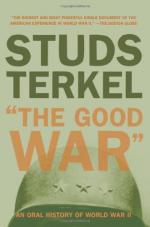
|
| Name: _________________________ | Period: ___________________ |
This test consists of 15 multiple choice questions and 5 short answer questions.
Multiple Choice Questions
1. As soon as Japan surrendered, what did American soldiers do in Japan, according to Akira Miuri?
(a) Drank and partied in the streets.
(b) Pillaged and looted villages.
(c) Distributed food and began rebuilding.
(d) Destroyed homes unnecessarily.
2. Under the Geneva Convention, what type of work did prisoners of war not have to do?
(a) Spying.
(b) Road repair.
(c) Farming.
(d) Manufacture of war material.
3. What surprised Anton Biler about his Japanese overseer in the prison camp?
(a) He was kind.
(b) He spoke English.
(c) He was against the war.
(d) He was from Seattle.
4. Why were the soldiers forbidden to keep diaries?
(a) There would be no time to sit and write.
(b) Diaries found by the enemy could give information.
(c) They were instructed to forget the tragedies they saw.
(d) Families should be protected from sad information.
5. Why did Londoners run toward parachuting soldiers?
(a) They wanted to arrest the enemy soldiers.
(b) They wanted to assist the Allied soldiers.
(c) They wanted to confiscate their weapons.
(d) They could use the paracutes to make clothing.
6. What did Betty Hutchinson say WWII veterans told their children about the war?
(a) Funny events.
(b) Nothing.
(c) Horror stories.
(d) Patriotic slogans.
7. Why didn't Maurice Wilson think the Filipinos would hide American escapees from the Japanese prison camp?
(a) The Filipinos were enemies as well.
(b) The Filipinos would turn them in for the reward.
(c) The Filipinos were afraid of the Japanese.
(d) The Filipinos hated the Americans.
8. What did soldiers on troop ships understand about their destination, according to General William Buster?
(a) Only where they would spend the first few weeks after landing.
(b) Only where they were landing.
(c) Nothing.
(d) Only what their mission would be upon landing.
9. What does Peter Ota tell us is worse than death in Japanese culture?
(a) Dishonesty.
(b) Shame.
(c) Unkindness.
(d) Fear.
10. What did the British women do with their goods during the war?
(a) Hoarded them.
(b) Swapped them.
(c) Sold them.
(d) Hid them.
11. What did most conversations among prisoners of war center around?
(a) Food.
(b) Sports.
(c) Sex.
(d) Politics.
12. What did people in Paducah burn in a bonfire?
(a) Posters of Hitler.
(b) All their Japanese products.
(c) All their German products.
(d) Emperor Hirohito's effigy.
13. How does Robert Rasmus feel about life's problems since the war?
(a) They're all major by comparison.
(b) They're all easier to handle because of that experience.
(c) They're all minor by comparison.
(d) They're all what he was trained to face.
14. How does Mike Royko believe most U.S. soldiers felt about the Korean conflict?
(a) They were glad to have their chance to fight.
(b) They wanted to defeat North Korea.
(c) They didn't understand it.
(d) They wanted to defend South Korea.
15. Why were people in San Francisco panicked after Pearl Harbor, according to Dennis Keegan?
(a) They believed the government would draft all young men.
(b) They believed the Germans would attack them next.
(c) They believed Japanese spies had infiltrated the city.
(d) They believed the Japanese would attack them next.
Short Answer Questions
1. What causes the disease of beriberi, that stops kidney function?
2. How did John Kenneth Galbraith say the bombing of Hamburg increased the German war effort?
3. What unusual food did Maurice Wilson eat in the Philippines?
4. What did Admiral Larocque think of the Japanese during the war?
5. How did American soldiers kill Hawaiian civilians?
|
This section contains 607 words (approx. 3 pages at 300 words per page) |

|




